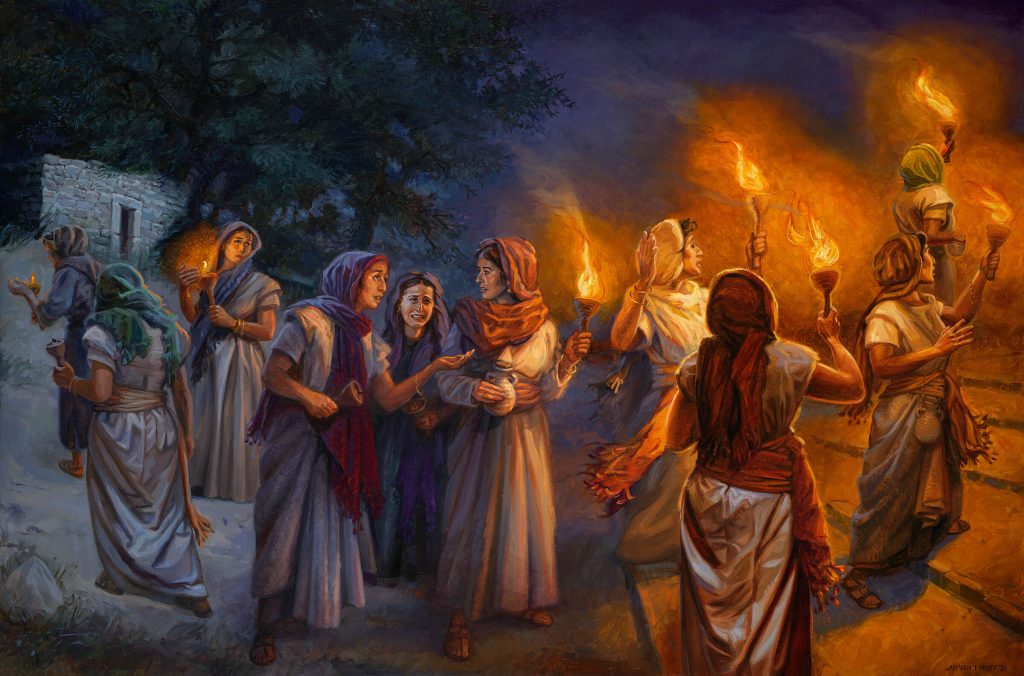During this Easter season, we are looking at a selection of Jesus’s parables. This evening we are reading through the Parable of the Importunate/Persistent Widow in Luke 18:1-8 and the Parable of the Ten Bridesmaids/Virgins in Matthew 25:1-13. In both parables, the main characters are women.
One of the radical aspects of the gospel is Jesus’ full inclusion of women in his ministry and his teachings. At the time of Jesus, Jewish society held a dim view of women. Jewish courts did not allow the testimony of women to be admitted, “on account of the levity and boldness of their sex.” Josephus, Antiquities, 4.8.15. The Old Testament Apocryphal book of Sirach written about 200 B.C. says that “From a woman sin had its beginning and because of her we all die. . . . If she (wife) does not go as you direct, separate her from yourself.” Sirach 25:24, 26. Ben Sirach goes on to advise “Do not sit in the midst of women; for from garments comes the moth, and from a woman comes a woman’s wickedness. Better is the wickedness of a man than a woman who does good; and it is a woman who brings shame and disgrace.” Sirach 42:12-14. And, of course, the woman caught in adultery, as related in John 8, apparently acted alone since only she was going to be stoned. Jesus, however, refused to follow societal conventions. As opposed to other rabbis, Jesus had female followers (Luke 8:1-3), taught to women (Luke 10:38-42, John 4:1-26), and his teachings usually balance male and female protagonists.
The other parallel we will look at between the parables is that both concern the second coming of Jesus. The same teaching of Jesus immediately precedes both parables that no one knows when the second coming will be, so we should always be ready. Luke 17:20-37, Matthew 24. Luke’s gospel resolves this discourse with the parable of the Persistent Widow whereas Matthew’s gospel resolves it with the parable of the Wise Servant and the parable of the Ten Virgins.
As we look at the Persistent Widow in Luke:
· What is the primary characteristic of the woman?
· How would you describe her actions?
· What one thing does Jesus say we should do to prepare for his return?
· How does this woman illustrate this point?
As we look at the Ten Virgins in Matthew:
· What is the overall purpose of the story? (The Boy Scouts have the same motto.)
· Who is the bridegroom? What is the wedding feast?
· Why did Jesus say there were ten virgins and not another number?
· Why didn’t the other bridesmaids share their oil? What does that teach us?
· What does the oil stand for in the parable? The negligent bridesmaids were sufficiently morally pure to enter the feast, yet they lacked something. What was the oil that they lacked?
Dinner is at 6. Discussion around 6:45. The menu this week is Chili. Please join us. (And you don’t have to have read, please come anyway!)
Let us cast slothfulness far away from us; let us carry our bright lamps and go to meet
Ode 8, Bridegroom Matins, Byzantine Catholic Church
Christ, the immortal Spouse whom we praise: Bless the Lord, all you works of the Lord.
May our souls be abundantly filled with the oil of charity, so that we do not have to go
and buy it, instead of welcoming the Bridegroom and singing: Bless the Lord, all you
works of the Lord. Since God has given you equal grace and strength, multiply your talent with the help of
Christ, to whom we sing: Bless the Lord, all you works of the Lord.

